英语名词性从句知识归纳图文稿
名词性从句知识结构图解

名词性从句定义:在句子中起名词作用的句子叫名词从句(Noun Clauses). 名词性从句包括主语,宾语,表语,同位语从句.h,等.在从句等在从句中做状语成分。
)I don’t know which book I should choose. (从句中缺定语)That she was chosen made a great stir (轰动) in her school.: ①it作形式主语的that-从句有以下四种不同的搭配关系:形容词+ that-从句It is necessary / important that….…是有必要/ 重要的….分词+ that-从句It is universally acknowledged that../ It is known that…众所周知…名词+ that-从句It is common knowledge/ a fact that………是常识/事实不及物动词+ that-分句It happens that…碰巧.. / It occurs to sb.that…突然想起……主语从句②It 作形式主语和it引导强调句的比较强调句:It is in the morning that the murder took place.(去掉该结构后,句子成分完整)主语从句:It was a pity that you shouldn’t go to see the film.(在句子中作主语成分)③whatever /whichever/ whoever引导主语从句的区别Whatever 是what的强调形式表示“无论什么”相当于anything that…Whatever / Anything that she does is wrong.whoever 是who的强调形式,表示‘无论谁’相当于anyone who….Whoever / Anyone who walks around in such a heavy rain will catch a cold.whichever ‘无论哪个;无论哪些’,既指人,又指物. 可修饰名词与of连用Whichever book you borrow doesn’t matter to us.Whichever of us fulfills his task will lend a hand to others.定义:在复合句中充当宾语功能的句子叫宾语从句We can learn what we didn’t know.We find it necessary that we (should) practice English every day.★某些作表语的形容词,如sure, happy, glad, certain等之后可带宾语从句I am glad that you can come and help me.wish/would rather后的宾语从句中要用虚拟语气。
高考英语语法之名词性从句总结 共34张PPT

引导词: 连接词:that, whether, if 连接代词:What she saw frightened her. Who has broken the glass is unknown. Whom we should serve is an important question. Which design is the best must be tried in practice. Whose watch was lost is unknown. 连接副词:When the contest will be held still needs to be discussed. Where the contest will be held still needs discussing . How the speech contest will be held still needs discussing . Why the sun rises in the east is interesting.
I’d like to know where the contest will be held.
高考英语语法之名词性从句总结 共34张PPT
高考英语语法之名词性从句总结 共34张PPT
宾语从句虚拟语气
“持令建球都” 后面的宾语从句要用虚拟语气(should)+do
I suggest that we should go tomorrow. The doctor insists that I (should)give up smoking. The seller demanded that payment should be made within five days. 注意:如果suggest作“表明、暗示”讲, insist作“坚持说、坚持认为”讲,则 其后的宾语从句中应该用陈述语气。
演示文稿4思维导图名词性从句
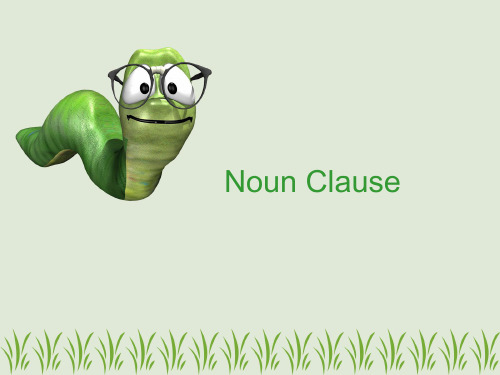
.
(Appositive Clause )
种类
引导词
注意事项
Conclusion
Fill in the blanks
1.It surprised us ____th_a__t __ he failed once again . 2. ___W__h_a__t _ surprised us was that he failed once again. 3.It makes no difference ____h_o_w___you treated me . 4. __W_h__ic_h__ team will win is hard to say . 5. _W__h__o_e_v_e_r_ breaks the rule will be punished . 6. The question is __w__h_e_t_h_e_r__he is getting along well with his work. 7. He looked _a_s__i_f _/ _th__o_u_g_hhe was going to cry . 8. The reason is ___t_h_a_t______ he lacks social experience . 9. His delay is due to the fact ____th__a_t__ the car went wrong halfway. 10. I have no idea ____w_h_e__re___ he lives . 11. Do you doubt _____t_h_a_t___ he will get the first prize ? 12. I wonder __W__h_e_t_h_e_r__/_if_ he will support our proposal. 13. He made it clear to the public ___th_a__t/_w_h__y_/h_o__w_he would quit his job. 14. A modern city has been set up in _____w_h_a_t____ was a wasteland ten years ago.
名词性从句讲解PPT课件
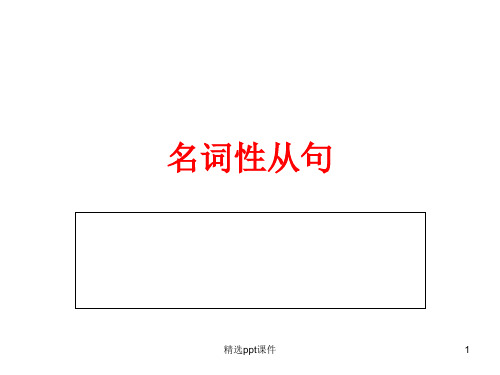
精选ppt课件
19
(一) 主语从句
1.概念: 在复合句中充当主语的句子叫做主 语从句.
要点1. 主语从句的时态不受主句的时态
影响和限制。
要点2:连词位于句首不能省略
要点3:主语从句大多数情况下视为三单
精选ppt课件
20
要点4:为了防止句子头重脚轻,通常
把形式主语it放在主语位置,真正主语搁 置于句末
2. whether可以做介词的宾语,if 不能。
3. whether引导的句子可以置于句首,if 只能放在主 句谓语动词之后。
4.引导宾语从句时whether、if可以互换。
5. whether+to do / or not ; if不能
6.wonder+if / whether / that
7.no matter whether / if
精选ppt课件
11
2.关系代词,关系副词(连接代词,连接副词)
(1)引导名词性从句的关系代词有
who ---谁(主格)
whom --谁(宾格)
what ----什么…..的东西;所….的 which --哪一个/些
whose ---谁的(所有格)
whatever—无论什么
whichever—无论哪个
名词的作用:
名词在句中作主语, 宾语,介词宾语,宾语补足语,表语 以及名词短语作状语。
精选ppt课件
2
1.主语:The bag is in the desk. 2.宾语:I washed my clothes yesterday.
3.表语:This is a good book. 4.宾语补语:We selected him our monitor.
高考英语名词性从句讲解(最全版)44948PPT课件
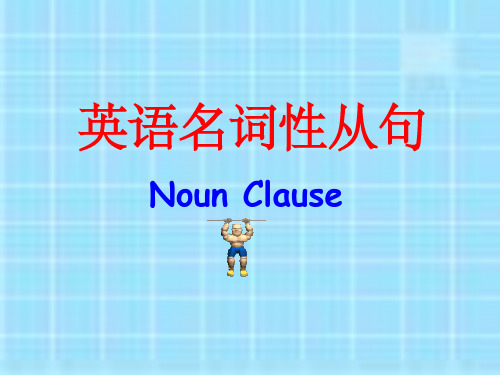
4、I knew the news that our team won the match.
宾语从句
5、His suggestion is that we should finish the
work at once.
表语从句
精选PPT课件
7
“whether”---“是否”、不作成份、起连接作用
英语名词1
请思考 定语从句的定义:
起定语作用,用来修饰名词或代词的从句。
名词性从句定义
起名词性作用的从句,叫名词性从句。 换言之,在英语的句子结构中,本来该由名词充当的 主语、宾语、表语和同位语部分,换由一个句子来充 当,这样的句子就是名词性从句。
精选PPT课件
useful for us now(. 同位语从句)
精选PPT课件
8
If与whether的区别:
If 只能引导两种名词性从句:宾语从句、不放于句首 的主语从句。Whether四种从句均可以引导。
请思考:
1、Whether she will come back on time depends on
weather . 2、I asked him whether he could do me a favor .
精选PPT课件
10
请用if / whether填空:
1、I asked her _i_f_/_w__h_e_t_h_er she had a bike. 2._W__h__e_ther we will hold a party in the open air
tomorrow depends on the weather.
record .(同位语从句)
精选PPT课件
名词性从句基础重点知识归纳课件

与将来事实相反的情况
表示对将来的虚拟
在虚拟语气中,与将来事实相反的情况通常使用一般将来时态或过去将来时态来表示。这种用法常见 于表达对未来情况的假设或愿望,例如在科幻小说、电影或剧本中。
05
名词性从句的特殊结构
it作形式主语
指代主语
在英语中,有时为了保持句 子结构的平衡或者为了强调 某个部分,我们使用“it” 作为形式主语,而真正的主 语则放在句子的后面。例如: “It is important to study English.”在这个句子中, “it”是形式主语,而真正 的主语是“to study English”。
避免句子头重脚轻
在英语中,如果一个句子的 主语太长或者太复杂,那么 将“it”作为形式主语可以 避免句子头重脚轻,使句子 结构更加平衡。例如:“It is not uncommon for students to make mistakes on exams.”在这 个句子中,“it”作为形式 主语,使得句子结构更加平 衡。
with复合结构
表示伴随情况
“with复合结构”是一种表示伴随情况的句型,通常用于描 述当某个动作发生时,另一个动作也同时发生。例如: “With the door open, the cat came in.”这个句子表示门 打开的同时,猫也进来了。
with复合结构
补充说明
“with复合结构”也可以用于补充说明某个动作的情况或 者背景。例如:“He lay on the bed, with his eyes closed.”这个句子表示他躺在床上,眼睛闭着。
01
02
03
04
who用于引导主语从句、宾 语从句和表语从句。
whom用于引导宾语从句。
名词性从句思维导图精编版
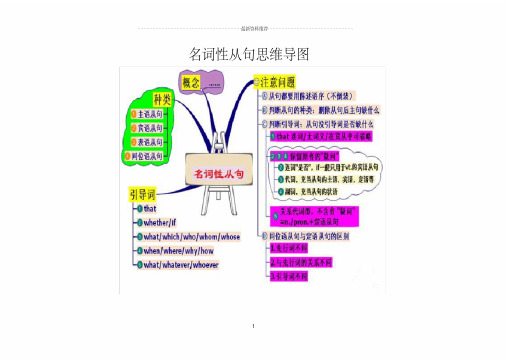
It must be proved that 必须…指 出 ……
between two stars. 过去一直认为新星是由于两颗星星之间碰
类 似的过 去分词还 有: known; estimated; expected; believed; 撞产生的。
thought; hoped; noted; discussed; required; decided; suggested; It has not been made clear when the new road is to be opened to
2
……………………………………………………………最新资料推荐…………………………………………………
表 一 : 主固 语定 从用 句法
和 译 法
( 3) It is + 过去 分词 +从句
( 4) It + 不及物 动词 +从句
It is said that 据说…… … It is reported that 据报道…… …
It is obvious that conductors and insulators are both important in
法
It is clear that 很清楚… ……
industry. 很明显导体和 绝缘体 在工业中都很重要。
和
It is likely that 很可能…… …
It is doubtful whether she will be able to come.
译
It is important that 重要的…是 ……
她是否能来令人怀疑。
法 ( 2) It is + 形容 类 似 的 形 容 词 还 有 : strange; natural; obvious ; true; good; It is essential that he should be here by the weekend .
高考英语语法专项-名词性从句(共42张PPT)

Noun Clause
名词性从句
Subject Clause
主语从句
Object Clause
宾语从句
Predicative Clause
表语从句
Appositive Clause
同位语语从句
三个考查点:
1. 连接词
2. 语序: 陈述句语序
3. 时态:若主句的时态是一般时,那么 从句可以是任何所需时态.若主句时 态是过去时,那么从句的时态必须是 过去时的一种.
Tom is a nice boy, except that he is sometimes late for school. 3.某些形容词如: sure, certain, glad, pleased, afraid, surprised, satisfied等后
面也可以跟宾语从句
I’m afraid that I can’t accept your invitation.
It’ said/ reported… that..据说/据报道…
I知t’s/宣be布en…announced/declared that..已经通
I巧t s..eems/appears.. that…显然、明显、碰 It’s no wonder that…并不奇怪/无疑…
…..
1.______C_____ is known to us all is that America is a developed country________ the First World.
连接词
连接词有: that, whether 和 lf
连接代词有:who, whom, whose which, what等 连接副词有: when, where, why, how 另
(完整版)名词性从句思维导图
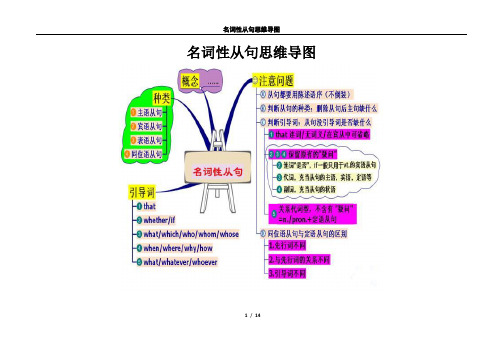
类似的不及物动词还有:seem, appear, occur, follow, happen, turn out, etc.
It turned out thatnobody remembered the address.
结果是无人记得那个地址。
It must be proved that…必须指出……
类似的过去分词还有:known; estimated; expected; believed; thought; hoped; noted; discussed; required; decided; suggested; demanded; made clear; found out,etc.
eg. I thought(that)you are free today.(╳)
I thought(that)you would be free today.(√)
【注意】当宾语从句叙述的是客观真理时,不管主句谓语的时态如何,从句都用一般现在时。eg.The teacher told us(that)the earth moves around the sun.
Whether she is coming or notdoesn’t matter too much.她来不来都无关紧要。
(3)用关系代词引导的主语从句。
What you needis more practice.你所需要的是更多的训练。
Whoever is top fromwins the game when two matched players meet.两强相争勇者胜。
It is thought thathe is the best player.大家都认为他是最好的选手。
3.8英语名词性从句知识归纳
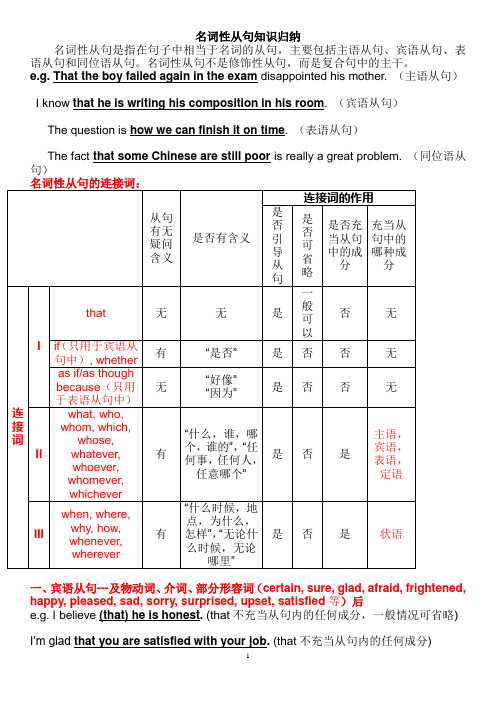
名词性从句知识归纳名词性从句是指在句子中相当于名词的从句,主要包括主语从句、宾语从句、表语从句和同位语从句。
名词性从句不是修饰性从句,而是复合句中的主干。
e.g. That the boy failed again in the exam disappointed his mother. (主语从句)I know that he is writing his composition in his room. (宾语从句)The question is how we can finish it on time. (表语从句)The fact that some Chinese are still poor is really a great problem. (同位语从句)一、宾语从句---及物动词、介词、部分形容词(certain, sure, glad, afraid, frightened, happy, pleased, sad, sorry, surprised, upset, satisfied等)后e.g. I believe (that) he is honest. (that不充当从句内的任何成分,一般情况可省略) I’m glad that you are satisfied with your job. (that不充当从句内的任何成分)He doesn’t care if/whether it isn’t a fine day. (if/whether不充当从句内的任何成分)Please tell me what you want. (what充当从句内的宾语)She always thinks of how she can work well.(how充当从句内的状语)I don’t believe whatever he said. (whatever充当从句内的宾语,意为“任何事”)I’ll take whoever wants to go. (whoever从当从句内的主语,意为“任何人”)二、主语从句---位于句首,常用it做形式主语e.g.That he will come and help you is certain. (that不充当从句内的任何成分,不可省略) Whether there is life on the moon is an interesting question. (whether不充当从句内的任何成分,不能用if)What he wants to tell us is not clear. (what充当从句内的宾语)Who will win the match is still unknown. (who充当从句内的主语)Where the English evening will be held has not yet been announced. (where充当从句内的状语)Whatever he said was right. (whatever充当从句内的宾语)It is known to us how he became a writer.(it为形式主语,代替how引导的主语从句)【主语从句要点拓展】1. it做形式主语的结构(1) It’s a pity/ a shame/ an honor/ a fact/ no wonder/ common sense/ good news that… 遗憾的是(荣耀的是、事实是、难怪是、常识是,好消息是……)e.g. It is a pity that you did n’t attend the lecture yesterday.(2) It’s clear/ right/ true/ certain/ necessary/ (un) likely/ important/ (im) possible/ obvious/ remarkable that… ……很清楚(正确,必要,重要,可能,值得注意等)e.g. It is likely that there will be a snowstorm tomorrow.(3) It is well-known/ reported/ recorded/ estimated/ said/ believed that…众所周知(据报道,据记载,据估计,据说,据人们相信)…e.g. It is said that his father left him nothing.(4)It turns out/ seems/ appears/ happens/ matters…) that…结果是……(似乎是, 碰巧是, 重要的是……)e.g. It happened (to me) that I had been away when he called.三、表语从句---系动词后(常见系动词:be, look, remain, seem, appear等)e.g. The problem is that they can’t get here early enough.The question is whether we can reduce the cost of the product.It looks as if it’s going to rain.The question is who (which of you) will be the next speaker.What he wants to get is whatever you have.This is where our problem lies.That is why he didn’t come to the meeting.四、同位语从句---抽象名词后(从句对抽象名词进行补充说明或解释说明抽象名词的内容)e.g. The news that he had landed on the moon spread all over the world.The thought came to him that Mary had probably fallen ill.He must answer the question whether he agrees to it or not.I have no idea when he will come back home.。
1高中英语_名词性从句(20张)基础

请大家来思考:
可不可以把两个或是两个以上的从 句合起来?
1. What he said at the meeting was that he would disagree with the plan.
2. She said that she had knew that his husband made a big mistake. 3. Her reply was that his performance was a failure, which made him very angry.
plan or not.
4. __h__o_w_______ he persuaded the man ager to
change the plan is interesting to us all
5. I wonder ___w__h__y_____ she refused my invitation.
是 notice 的具体的内容。
引导名词性从句的连接词
1、连接代词: who, whose, whom, what, which 有词 义,在从句中担任成分,如主语、表语、宾语、或
定语等。
2、连接副词:。when, where, why, how 有词义,在 从句中担任成分,作状语。
3、连接词:。that, whether, if, as if that 无词义, 在从句中不担任成分,有时可省略;if (whether), as if(好像)虽有词义,但在从句中不担任成分。 注whoever,whosever,whomever,whatever,whichever Whenever,wherever,however 表示无论··也可引导
特别注明:怎么来判断表语呢?
(完整word版)名词性从句思维导图
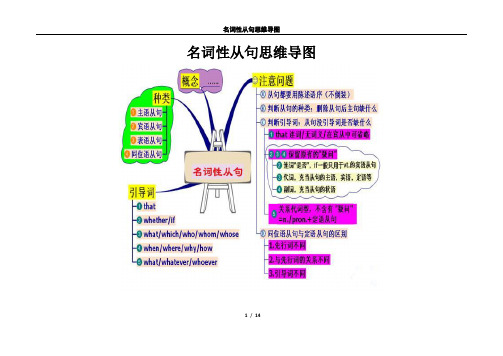
It +某些固定结构+主语从句。
例如:It doesn’t make too much difference(It doesn’t make any difference / It doesn’t alter the situation),whether it rains or not .下不下雨都没有多大关系。
He insisted thathe didn’t steal her watch.他坚持说他没有偷她的手表。
His smile suggested thathe did well in the interview.他的微笑表明他面试得很好。
3.动词wish后的宾语从句也要用虚拟语气,即从句谓语用过去式(针对现在情况而言)、过去完成时(针对过去情况而言)或用“would / should / could / might +动词原形”(针对将来情况而言)。
b.在介词前:It dependson(依靠)whetherit is going to rain.
c.与or not连用:They are talking aboutwhetherto go thereor not.
eg.Tom don't knowif/whether his grandpa liked the present.
It is thought thathe is the best player.大家都认为他是最好的选手。
It is used to be thought thata new star must be due to a collision between two stars.过去一直认为新星是由于两颗星星之间碰撞产生的。
英语名词性从句知识归纳

英语名词性从句知识归纳(总6页)-CAL-FENGHAI.-(YICAI)-Company One1-CAL-本页仅作为文档封面,使用请直接删除名词性从句知识归纳名词性从句是指在句子中相当于名词的从句,主要包括主语从句、宾语从句、表语从句和同位语从句。
名词性从句不是修饰性从句,而是复合句中的主干。
e.g. That the boy failed again in the exam disappointed his mother. (主语从句)I know that he is writing his composition in his room. (宾语从句)The question is how we can finish it on time. (表语从句)The fact that some Chinese are still poor is really a great problem. (同位语从句)一、宾语从句---及物动词、介词、部分形容词(certain, sure, glad, afraid, frightened, happy, pleased, sad, sorry, surprised, upset, satisfied等)后e.g. I believe (that) he is honest. (that不充当从句内的任何成分,一般情况可省略)I’m glad that you are satisfied with your job. (that不充当从句内的任何成分)He doesn’t care if/whether it isn’t a fine day. (if/whether不充当从句内的任何成分)Please tell me what you want. (what充当从句内的宾语)She always thinks of how she can work well. (how充当从句内的状语)I don’t believe whatever he said. (whatever充当从句内的宾语,意为“任何事”)I’ll take whoever wants to go. (whoever从当从句内的主语,意为“任何人”)【宾语从句要点拓展】1. that引导宾语从句时一般可以省略,若由and或or 连接两个宾语从句时,第一个从句中的that可以省略,而第二个分句前的that不可省略。
名词性从句总结归纳 PPT

{I don’t like his job、
宾语 I don’t like what he does every day、
{I don’t know about the man, Mr、 White、
同位语 I don’t know about the fact that he is a teacher、
单句改错
1、 I didn’t know that you will e、 would 2、 He said that he is writing a story、was
时态变化
3、 Could you tell me when will he arrive?he will
4、 You can begin to see why does English have
1、Mrs、Liu , our English teacher , doesn’t live far from school 、 2、 My friend , Zhanghui , often helps other classmates 、 3、The news that our class won the basketball match made me very happy 、 4、They asked me the question whether he came from America 、
Appositive clause
Task 1
请您们瞧一下下面得例句,写出它们划线部分得 句类型:①主语从句②表语从句③ 宾语从句
1、She wants to know what kind of films I like 、
宾( __语__从__句___ ) 2、That is what I want to tell you表、语(_从__句______ )
高中英语名词性从句详细讲解演示文稿

否定转移
若主句谓语动词为think, consider, suppose, believe, expect, fancy, guess, imagine等,其后的宾语从句若含
有否定意义,一般要把否定词转移到主句谓语上,从句
谓语用肯定式。例如:
我认为他不会来这里.
I think he won’t come here.
Exercises
1_________ in the regulations that you should not tell other people the pass word of your e-mail account. .(2005上海)
A. What is required
B .What requires
C .That is D. It is
3.After Yang Liwei succeeded in circling the earth,_______ our astronauts desire to do is walk in space.(2004 上海)
A .where B .what
It appears that…
似乎…
It happens that ….
碰巧…
It occurred to me that…… 我突然想起……
第八页, 不相信、惋惜、理应如此等语气时, 谓语动词要用 虚拟语气 “(should) +do”,常用的句型有:
two days.
第二十页,共39页。
Exercises: “it”作形式主语或形式宾语:
1.I hate ___A_ when people talk with their mouths full.
- 1、下载文档前请自行甄别文档内容的完整性,平台不提供额外的编辑、内容补充、找答案等附加服务。
- 2、"仅部分预览"的文档,不可在线预览部分如存在完整性等问题,可反馈申请退款(可完整预览的文档不适用该条件!)。
- 3、如文档侵犯您的权益,请联系客服反馈,我们会尽快为您处理(人工客服工作时间:9:00-18:30)。
英语名词性从句知识归纳集团文件发布号:(9816-UATWW-MWUB-WUNN-INNUL-DQQTY-名词性从句知识归纳名词性从句是指在句子中相当于名词的从句,主要包括主语从句、宾语从句、表语从句和同位语从句。
名词性从句不是修饰性从句,而是复合句中的主干。
e.g. That the boy failed again in the exam disappointed his mother. (主语从句)I know that he is writing his composition in his room. (宾语从句)The question is how we can finish it on time. (表语从句)The fact that some Chinese are still poor is really a great problem. (同位语从句)一、宾语从句---及物动词、介词、部分形容词(certain, sure, glad, afraid, frightened, happy, pleased, sad, sorry, surprised, upset, satisfied等)后e.g. I believe (that) he is honest. (that不充当从句内的任何成分,一般情况可省略)I’m glad that you are satisfied with your job. (that不充当从句内的任何成分)He doesn’t care if/whether it isn’t a fine day.(if/whether不充当从句内的任何成分)Please tell me what you want. (what充当从句内的宾语)She always thinks of how she can work well. (how充当从句内的状语)I don’t believe whatever he said. (whatever充当从句内的宾语,意为“任何事”)I’ll take whoever wants to go. (whoever从当从句内的主语,意为“任何人”)【宾语从句要点拓展】1. that引导宾语从句时一般可以省略,若由and 或or连接两个宾语从句时,第一个从句中的that可以省略,而第二个分句前的that不可省略。
e.g. He told me (that) they could not decide what to do andthat they asked my advice.2. whether和if引导宾语从句一般可以互换使用,但以下情况只能使用whether(1) whether可与or not连用 e.g. I want to know whether he will see the film or not.(2) 介词宾语从句要用whether e.g. I don’t care about whether you have money or not.(3) that引导的宾语从句只能放于in, except, besides和but四个介词后e.g.The Swede stood still, except that his lips moved slightly.3. 转移否定---当主句是I/ We think (believe, consider, expect, suppose, guess, imagine) 时,其后的宾语从句如果是否定形式,常把从句中的否定词not转移到主句中。
e.g. I don’t suppose (that) it is his fault, is it?4.时态问题---宾语从句的时态常受到主句时态影响,若主句是现在时或将来时,从句可用任何所需要的时态;若主句是过去时态,从句一般用过去的某种形式,如:一般过去时,过去进行时,过去将来时等;当从句表示的是客观真理,科学原理,自然现象,则从句仍用一般现在时态。
e.g. I know(that) he didn’t tell you what he would come then.We believed that he had earned enough money to build ahouse.The teacher told us that Tom had left us for America.The teacher told us that the sun rises in the east.5. 一种特殊类型的宾语从句---在这种句子里do you think等意为插入语,但实为主句,因此余下部分应用陈述语序余下部分?e.g. Where do you guess our art festival is to be heldWho do you think the public might choose as their favoritesinger this year二、主语从句---位于句首,常用it做形式主语e.g. That he will come and help you is certain. (that不充当从句内的任何成分,不可省略)Whether there is life on the moon is an interestingquestion. (whether不充当从句内的任何成分,不能用if)What he wants to tell us is not clear. (what充当从句内的宾语)Who will win the match is still unknown. (who充当从句内的主语)Where the English evening will be held has not yet been announced. (where充当从句内的状语)Whatever he said was right. (whatever充当从句内的宾语)It is known to us how he became a writer. (it为形式主语,代替how引导的主语从句)【主语从句要点拓展】1. it做形式主语的结构(1) It’s a pity/ a shame/ an honor/ a fact/ no wonder/ commonsense/ good news that… 遗憾的是(荣耀的是、事实是、难怪是、常识是,好消息是……)e.g. It is a pity that you didn’t attend the lecture yesterday.(2) It’s clear/ right/ true/ certain/ necessary/ (un) likely/ important/ (im) possible/ obvious/ remarkable that… ……很清楚(正确,必要,重要,可能,值得注意等)e.g. It is likely that there will be a snowstorm tomorrow.(3) It is well-known/ reported/ recorded/ estimated/ said/b elieved that…众所周知(据报道,据记载,据估计,据说,据人们相信)…e.g. It is said that his father left him nothing.(4)It turns out/ seems/ appears/ happens/ matters…) that…结果是……(似乎是, 碰巧是, 重要的是……)e.g. It happened (to me) that I had been away when he called.2. it做形式主语与it is(was)… that…强调句式的区分e.g. It is a pity that you didn’t go to see the film.It is in the morning that the murder took place.解题方法:将it is/was… that 去掉,看余下部分是否完整,若完整即为强调句式;反之为it作形式主语。
三、表语从句---系动词后(常见系动词:be, look, remain, seem, appear等)e.g. The problem is that they can’t get here early enough.The question is whether we can reduce the cost of the product.It looks as if it’s going to rain.The question is who (which of you) will be the next speaker.What he wants to get is whatever you have.This is where our problem lies.That is why he didn’t come to the meeting.四、同位语从句---抽象名词后(从句对抽象名词进行补充说明或解释说明抽象名词的内容)e.g. The news that he had landed on the moon spread all overthe world.The thought came to him that Mary had probably fallen ill.He must answer the question whether he agrees to it or not.I have no idea when he will come back home.名词性从句高考趋势与考察重点一、语序问题---名词性从句内部一律使用陈述语序注意以下句子:e.g. I don’t know what is the matter with him.I have no idea what was the matter with him.Could you tell us what was wrong/ the trouble with him yesterday二、从句中的虚拟语气问题1. 主语从句:(1) It is important/ natural/ necessary/ essential/ strange/that …(should) do…(2) It is suggested/ advised/ demanded/ ordered/ requestedthat … (should) do…e.g. It is important that every student (should) learn aforeign language.It is suggested that students (should) check their answers before handing in the paper.2. 宾语从句:在表示“命令、要求、建议、决定”等意义的动词后的宾语从句常用“(should)+ do”【insist(坚持),order, urge, command(命令),require, request, demand(要求),advise, suggest, propose, recommend(建议)】e.g. The commander ordered that troops (should) set off at once.The doctor suggested that he (should) give up smoking.3. 表语从句:当主句的主语为order, command, requirement, request, demand, advice, suggestion, proposal, recommendation等名词时,表语从句的谓语动词用“ (should) do”的形式。
